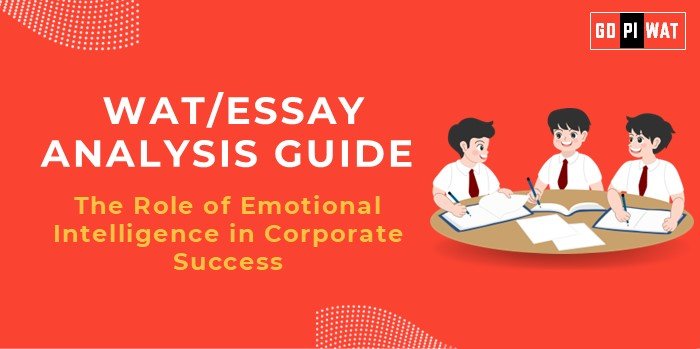📋 Written Ability Test (WAT)/Essay Analysis Guide: The Role of Emotional Intelligence in Corporate Success
🌐 Understanding Emotional Intelligence’s Importance
Emotional intelligence (EI) is not just a soft skill but a critical competency in corporate leadership, influencing decision-making, conflict resolution, and team dynamics. For B-school aspirants, exploring its applications in management provides valuable insights into real-world challenges.
📝 Effective Planning and Writing
- ⏳ Time Allocation:
- Reading & Planning: 5 minutes
- Writing: 20 minutes
- Review: 5 minutes
- 💡 Structure:
- Introduction: 60-70 words
- Body: 350-375 words
- Conclusion: 60-70 words
💡 Introduction Techniques for Essays
- Contrast Approach:
“While technical skills build careers, emotional intelligence drives them to success, bridging the gap between knowledge and its application in human contexts.”
- Solution-Based Introduction:
“In today’s corporate landscape, emotional intelligence emerges as the solution to navigating workplace complexities.”
📊 Structuring the Essay Body
- Achievements: Highlight measurable impacts, such as increased productivity and reduced conflicts.
- Challenges with Comparative Analysis: Discuss cultural and measurement barriers, citing examples like Japan’s adapted EI programs.
- Future Outlook: Advocate for integrating EI into leadership development, supported by data.
✍️ Concluding Effectively
- Balanced Conclusion:
“Emotional intelligence, while not a panacea, is indispensable in fostering cohesive, high-performing teams.”
- Global Comparison Conclusion:
“Drawing lessons from global practices, embedding EI in corporate strategies can elevate organizational success.”
📈 Analyzing Successes and Shortcomings
- Key Achievements: Higher employee retention, better team dynamics.
- Challenges: Cultural adaptation, lack of standardization.
🌍 Recommendations for Sustainable Progress
- Standardize EI assessment tools.
- Incorporate EI training in leadership programs.
- Promote cross-cultural EI understanding.
📘 Sample Short Essays
- Balanced Perspective:
“While emotional intelligence may not replace technical acumen, it bridges critical gaps in leadership and team management, fostering success in today’s corporate landscape.”
- Solution-Oriented:
“To thrive in a competitive world, corporations must integrate emotional intelligence into leadership frameworks, ensuring sustainable and inclusive growth.”
- Global Comparison:
“From Google’s empathy-driven culture to Japan’s harmony-focused EI training, emotional intelligence proves its universal value in achieving corporate excellence.”


